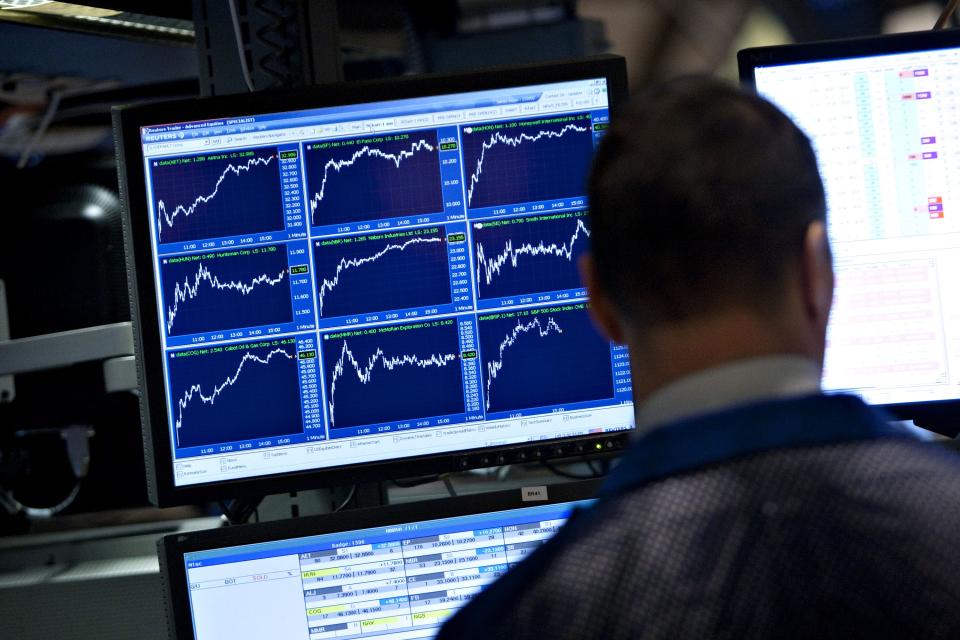Mom and pop investors pile into stocks as some fund managers move out
In the face of falling stock prices and potentially negative trade deals from the administration of U.S. President Donald Trump, individual retail investors have kept their cool and even added risk. Some fund managers, however, are doing the opposite.
The market selloff in February and the March downturn that has followed, pushing stocks into negative return territory for 2018, has apparently made retail investors more bullish. Research shows that so-called mom and pop investors, those investing their own money rather than that of large institutional or pension funds, have added to their stock holdings lately. A recent survey from Bankrate.com found 15% of investors contributed more money to stock investments during the February market correction. The majority (60%) intentionally did nothing. Just 6% of investors moved money out of stock-related accounts. (Bankrate reported 16% of respondents didn’t know the correction had happened and another 3% responded to the survey with “other.”)
Additionally, data from Jefferies’ Global Asset Fundflows tracker showed that in the week ending March 14, a record $43 billion was pumped into global and U.S. equity mutual and exchange-traded funds (ETFs). U.S. equities alone saw $35 billion of inflows, a record high.
“It’s time to de-risk a little bit”
But fund managers who oversee large funds holding millions and sometimes billions of dollars don’t necessarily share the enthusiasm. A number told Yahoo Finance that as the talk of the United States instituting tariffs has heated up, along with growing chaos in the White House and the specter of higher U.S. interest rates from the Federal Reserve, they are cutting back on stocks in their portfolios.
“I think it’s time to de-risk a little bit. You have to,” said Alicia Levine, head of global investment strategy at BNY Mellon Investment Management, which manages just under $2 trillion in assets. Levine added that she’s “going into cash” as well as upping her allocation to other asset classes.
Levine said the onslaught of negative headlines from Washington since last year had made her a bit more cautious.

“To me, that’s a left-tail risk that I am not going to ignore and I would tell our investors, ‘You can’t ignore this,'” she said.
Left-tail risk refers to the possibility of an event driving down asset prices more than the standard deviation of typical price moves; in other words a significant negative.
Hugh Anderson, managing director at HighTower Advisors in Las Vegas, which managers about $800 million, said his firm has been reducing exposure to risky assets like U.S. stocks for about a year.
“We’ve increased our cash exposures, added to alternative allocation, reduced U.S. exposure [in favor of] lower cost international markets and taken profits,” Anderson said, noting that he’s reduced his exposure to U.S. assets by about 15%.
For Anderson, unwieldy trade and economic policy from the Trump administration could prove the catalyst for a selloff in U.S. equities, but he thinks the real cause will be higher interest rates as a result of the Federal Reserve’s rate hiking cycle, expected to continue this week at the Fed’s March meeting.
The increase in U.S. debt – from mortgages, student loans, corporations and the government – has created an an environment untenable with rising debt levels, he said.
Other fund managers have not pulled the trigger yet, but stand ready to unload stocks should proposed trade restrictions by the Trump administration become reality and lead to a global standoff between heavyweights like the United States and China.
Angus Sippe, a multi-asset portfolio manager at Schroders, said that he remains “fully invested” and positive on global economic fundamentals, but has diversified his current holdings to include commodities and other assets that should benefit from increased inflation. He has also moved to favoring small-cap stocks over large-cap as they should see less blowback from a pullback in global trade.
“If we went to a full-scale, full-blown trade war we would be looking to de-risk our portfolios significantly because you get yourself into a stagflationary environment, which is lower growth and higher inflation, which is the eye of the storm,” Sippe said.
Asked what “de-risking” means, Sippe responded, “We would be selling equities. … We can’t go to 100% cash, but we would be significantly reducing our equity holdings in the portfolio.”
—
Dion Rabouin is a markets reporter for Yahoo Finance. Follow him on Twitter: @DionRabouin.
Follow Yahoo Finance on Facebook, Twitter, Instagram, and LinkedIn.

 Yahoo Finance
Yahoo Finance 
